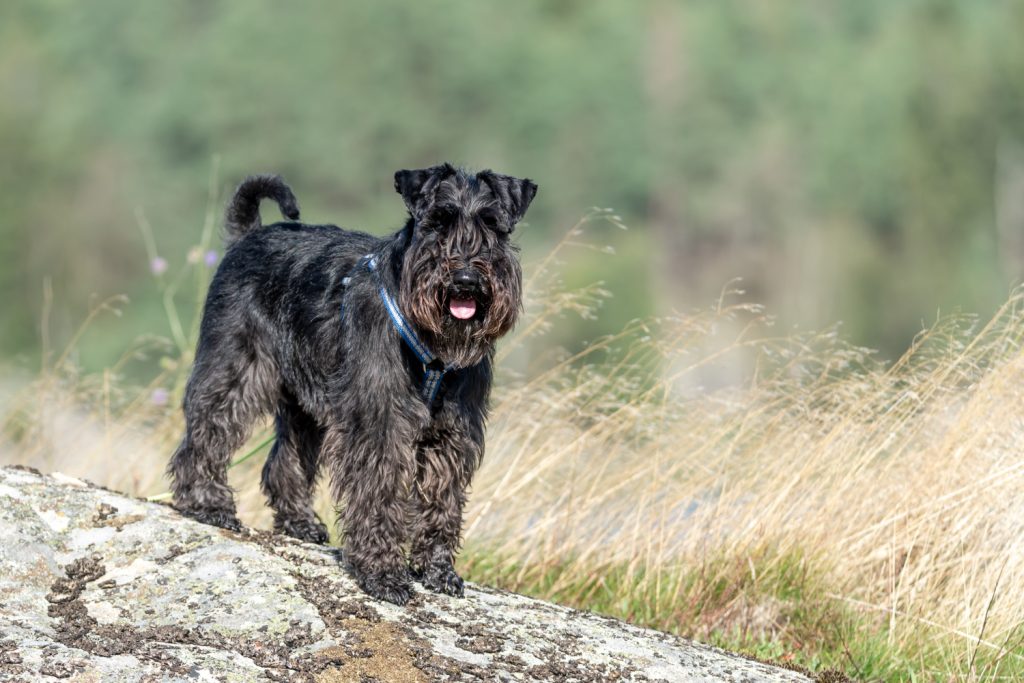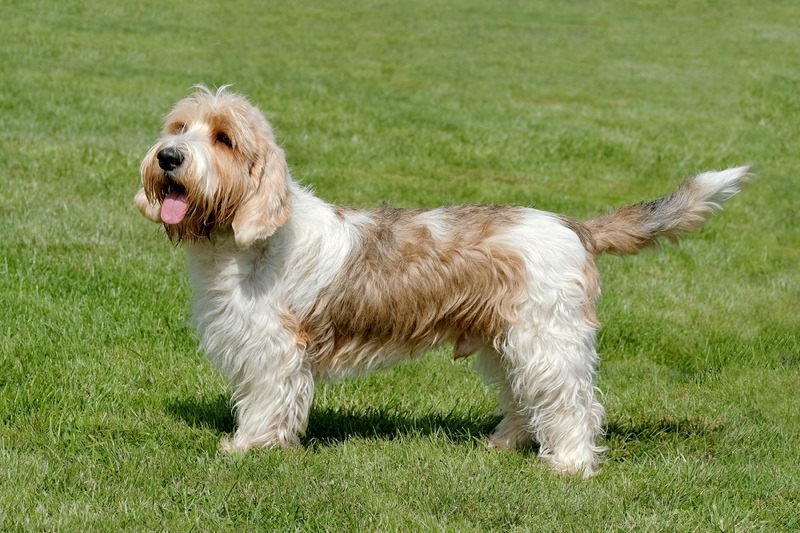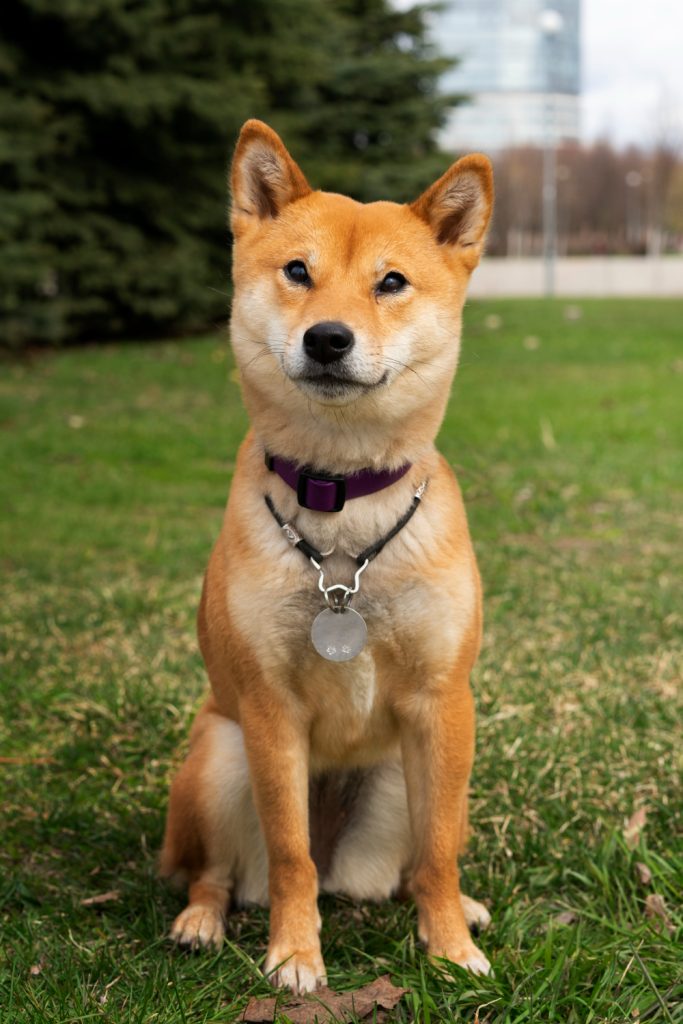Introduction
The Curly-Coated Retriever, a majestic and highly intelligent breed, is one of the oldest retriever breeds. Known for their distinctive curly coat and athletic build, these dogs make excellent companions for active individuals and families. Originally bred for hunting, the Curly-Coated Retriever is a versatile and energetic breed, excelling in both fieldwork and as a loving family pet. Whether you’re considering adopting a Curly-Coated Retriever or simply interested in learning more about them, this guide will cover everything you need to know about their care, training, and adoption.
Quick Facts Summary
- Group: Sporting
- Height: 23-27 inches
- Weight: 60-95 pounds
- Coat Type and Colors: Short, tight curls; available in black or liver
- Lifespan: 10-12 years
- Temperament: Independent, intelligent, friendly, loyal, energetic
- Hypoallergenic Status: No
- Origin: England
Origin and History
The Curly-Coated Retriever is one of the oldest retriever breeds, originating in England in the late 18th century. Bred primarily for retrieving game from water, the breed’s distinctive curly coat helped protect it from harsh weather conditions while hunting. Though less popular today than other retrievers like the Labrador or Golden Retriever, the Curly-Coated Retriever is still cherished by hunters and dog enthusiasts alike. Their history is rooted in the waterfowl hunting traditions of English estates, making them excellent swimmers with a strong work ethic.
Over time, breeders developed the Curly-Coated Retriever by crossing them with other retrieving breeds, including the Newfoundland and possibly the Irish Water Spaniel. Their unique appearance and versatile abilities earned them a reputation as capable retrievers both on land and in water.
Physical Traits and Appearance
Size and Build
Curly-Coated Retrievers are robust, medium-to-large-sized dogs. Males typically range between 25-27 inches in height, while females are slightly smaller at 23-25 inches. They generally weigh between 60 and 95 pounds. Despite their size, they have an athletic, agile build, with long legs and a well-muscled body that enables them to move swiftly through water or across rough terrain.
Coat and Colors
The hallmark of the Curly-Coated Retriever is its dense, curly coat. Unlike most retrievers, this breed has tight, water-resistant curls covering its body, making them ideal for cold water retrieves. The coat comes in two primary colors: black and liver (a rich, reddish-brown). Grooming is relatively low-maintenance for this breed, as their coat naturally sheds dirt and water, although occasional brushing helps prevent matting.
Distinctive Features
Aside from their curly coat, these retrievers have a distinctive head shape with a relatively narrow, long muzzle and small, almond-shaped eyes. Their ears are set low, and their tails are straight and strong, often covered in the same curls as the body. These features give the Curly-Coated Retriever a regal, intelligent appearance that sets them apart from other retriever breeds.
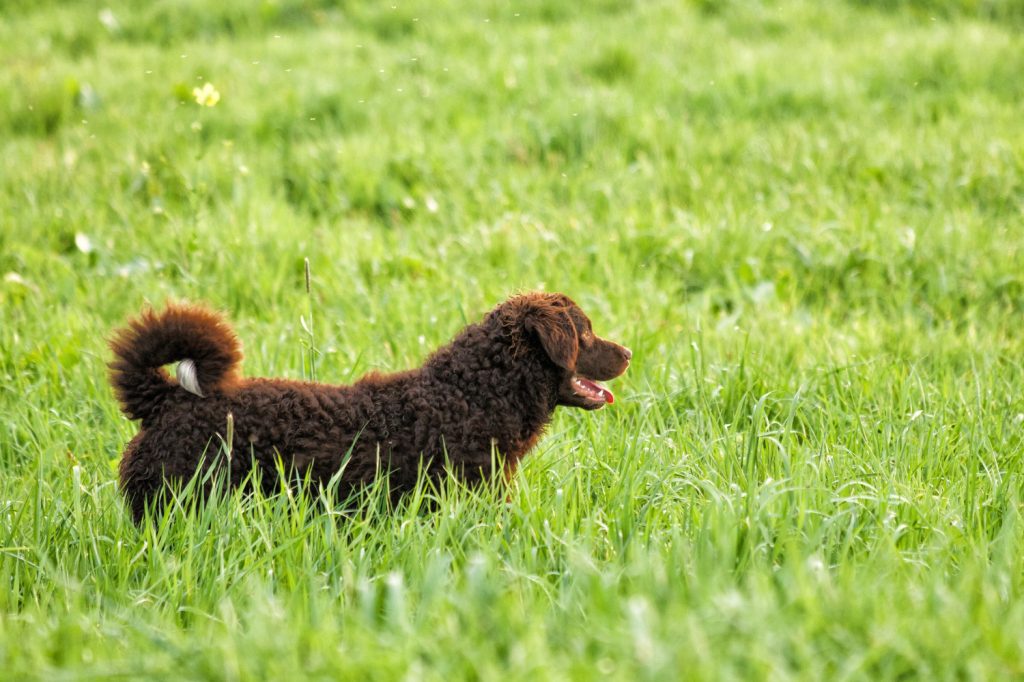
Temperament and Behavior
Personality Traits
Curly-Coated Retrievers are known for their friendly, independent, and intelligent nature. They are loyal dogs that form strong bonds with their families. While they are affectionate, they can be more reserved than other retriever breeds. This independence is often seen as a sign of their intelligence, making them quick learners but sometimes a bit stubborn.
Interaction with Children, Pets, and Strangers
Curly-Coated Retrievers are excellent family dogs and typically get along well with children. Their playful and energetic nature makes them great companions for active kids. However, like all dogs, early socialization is key to ensuring they interact well with other pets and strangers. They are generally good with other dogs but may be more aloof or cautious with unfamiliar people, requiring positive reinforcement to maintain proper behavior.
Trainability and Intelligence
This breed is highly intelligent and excels in various training activities, including obedience, agility, and even search-and-rescue work. However, their independent streak can make them somewhat challenging to train for inexperienced owners. Consistency, patience, and positive reinforcement are crucial. They thrive in environments that provide mental stimulation, such as agility courses or advanced obedience training.
Health and Wellness
Common Health Issues
Curly-Coated Retrievers are generally healthy, but like all breeds, they are prone to specific health issues. These can include:
- Hip Dysplasia: A common issue in larger dogs, hip dysplasia can cause discomfort and mobility problems.
- Elbow Dysplasia: Another joint issue that affects mobility.
- Bloat: A life-threatening condition where the stomach twists, requiring immediate medical attention.
- Cancer: Like many breeds, Curly-Coated Retrievers may be at risk for certain cancers as they age.
- Eye Problems: Cataracts and other eye conditions may develop in older dogs.
Health Checks and Screenings
When adopting a Curly-Coated Retriever, it’s essential to ensure that the breeder conducts necessary health screenings, particularly for hip and elbow dysplasia. Regular vet checkups, vaccinations, and dental care are critical to keeping your Curly-Coated Retriever in good health.
Diet and Nutrition
A high-quality diet tailored to the dog’s age, size, and activity level is vital. Curly-Coated Retrievers are active dogs that require a diet rich in protein to support muscle health. Be mindful of portion control to avoid obesity, and provide a balanced mix of protein, fats, and carbohydrates, along with necessary vitamins and minerals.
Grooming and Maintenance
Coat Care
Despite their curly coat, Curly-Coated Retrievers require relatively low grooming. Weekly brushing is typically enough to keep their coat in good condition. Regular grooming sessions also help to remove loose hairs and prevent matting.
Skin, Ear, Eye, and Dental Care
Regular ear cleaning is necessary to prevent infections, especially since their ears can trap moisture. Keeping their eyes clean and performing routine dental care is also essential to avoid periodontal disease.
Hypoallergenic Potential
While their curly coat might lead some to believe they are hypoallergenic, Curly-Coated Retrievers are not hypoallergenic. However, their tight curls do minimize shedding, which can help reduce allergens in the home.
Exercise and Activity Requirements
Exercise Needs
Curly-Coated Retrievers are highly active dogs that need plenty of exercise to stay happy and healthy. A combination of long walks, playtime, and mental stimulation is essential. They are natural swimmers and excel at activities like fetch, agility, and even dock diving.
Mental Stimulation
Because of their intelligence, they also require mental stimulation to prevent boredom. Interactive toys, puzzle games, and advanced training exercises can help keep their minds engaged.
Lifestyle Compatibility
Living Conditions
Curly-Coated Retrievers are best suited for homes with access to outdoor space, as they thrive in environments where they can run and explore. They can adapt to apartment living, but owners must be committed to providing ample exercise. They are not ideal for sedentary households.
Compatibility with Different Lifestyles
This breed is perfect for active individuals or families who enjoy outdoor activities like hiking, running, or swimming. However, their high energy may not make them suitable for elderly individuals or less active families.
Weather Adaptability
Thanks to their dense, water-resistant coat, Curly-Coated Retrievers tolerate cold weather well. However, they may struggle in extremely hot climates, so it’s essential to ensure they have plenty of water and shade during warmer months.
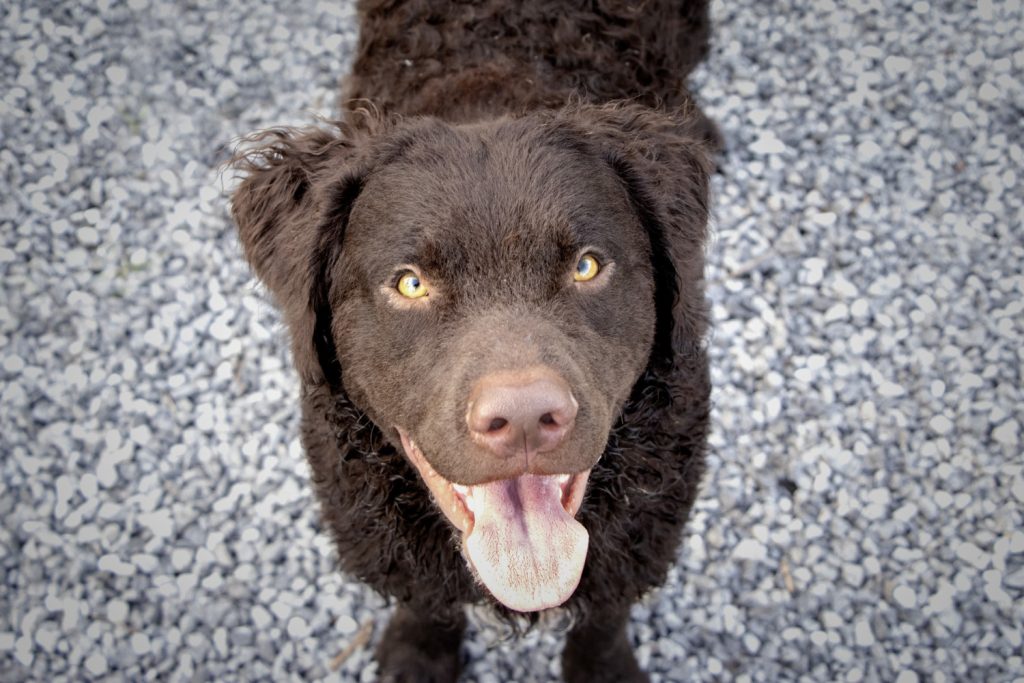
Adoption, Buying, and Ethical Considerations
Finding a Reputable Breeder or Rescue
When adopting a Curly-Coated Retriever, it’s crucial to choose a responsible breeder who follows ethical breeding practices. Look for breeders who provide health clearances for the puppies’ parents and allow you to meet the puppy’s mother and siblings.
Adoption Tips
Consider adopting from a rescue organization. Many Curly-Coated Retrievers end up in shelters due to owners underestimating the breed’s energy and training needs. Adoption costs are often lower than purchasing from a breeder, and you’re giving a dog a second chance at a happy home.
Puppy Mills and Scams
Avoid puppy mills or breeders who focus solely on profit rather than the welfare of the dogs. These operations often have poor living conditions and lack proper health screenings, leading to potential health issues down the line.
Pros and Cons
Pros:
- Loyal and Affectionate Companions
- Curly-Coated Retrievers are known for their loyalty and form strong bonds with their families. They can be affectionate and protective, making them excellent companions.
- Intelligent and Trainable
- They are highly intelligent and capable of learning advanced commands. With the right training methods, they can excel in activities like agility, obedience trials, and hunting tasks.
- Low-Maintenance Grooming
- Despite their unique curly coat, they are relatively low maintenance in terms of grooming. Their coats naturally repel dirt and water, and weekly brushing is usually enough to keep them looking neat.
- Great with Active Families
- Their energetic nature makes them ideal for families or individuals who enjoy outdoor activities. They love swimming, running, and engaging in interactive play, making them great for those with an active lifestyle.
- Good with Children and Other Pets
- Curly-Coated Retrievers tend to be friendly and patient with children, making them good family dogs. Early socialization can also help them get along with other pets.
Cons:
- Independent and Stubborn
- While intelligent, they can be independent and stubborn, which may make training challenging for first-time dog owners. They require consistent, patient training methods and may not respond well to harsh corrections.
- High Exercise Needs
- Curly-Coated Retrievers are very active and require plenty of daily exercise. Without enough physical and mental stimulation, they can become bored and develop destructive behaviors. They are not well-suited to sedentary households or people with a more laid-back lifestyle.
- Not Hypoallergenic
- Although their curly coats shed less than some other breeds, they are not considered hypoallergenic. People with dog allergies may still have reactions around them, though the tight curls can help reduce the spread of allergens.
- May Be Reserved with Strangers
- Curly-Coated Retrievers can be more aloof and cautious with strangers compared to other retrievers, which may require extra socialization to prevent them from becoming too wary of new people.
- Prone to Health Issues
- Like many large breeds, Curly-Coated Retrievers are prone to specific health problems such as hip dysplasia, bloat, and cancer. Potential owners should be prepared for regular health checks and vet care to manage any issues that arise.
Similar Breeds
If you’re interested in a Curly-Coated Retriever, you might also consider:
- Labrador Retriever
- Irish Water Spaniel
- Flat-Coated Retriever
- Chesapeake Bay Retriever
FAQs
Are Curly-Coated Retrievers rare?
Yes, they are less common than other retriever breeds, particularly outside of hunting circles.
Are Curly-Coated Retrievers good family dogs?
Yes, they are loyal and affectionate with family members, though they may be more independent than other retrievers.
Do Curly-Coated Retrievers shed a lot?
No, their curly coat minimizes shedding compared to other retriever breeds.
Conclusion
The Curly-Coated Retriever is a distinctive and versatile breed, ideal for those looking for an active, intelligent, and loyal companion. With proper care, training, and exercise, they can be wonderful family pets or skilled working dogs. If you have the energy and commitment to meet their needs, a Curly-Coated Retriever could be the perfect addition to your home.


